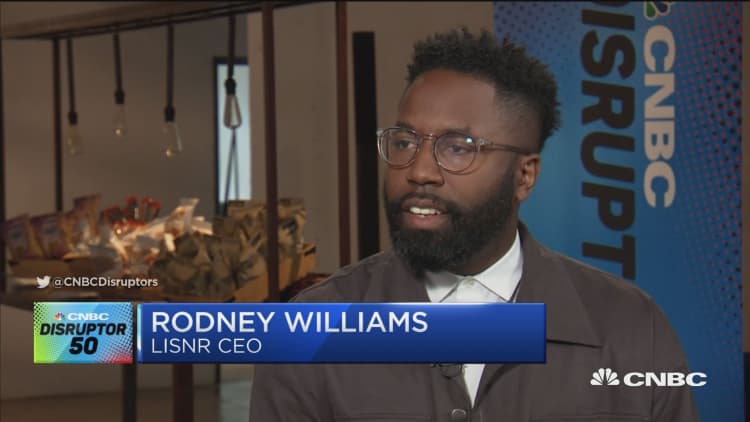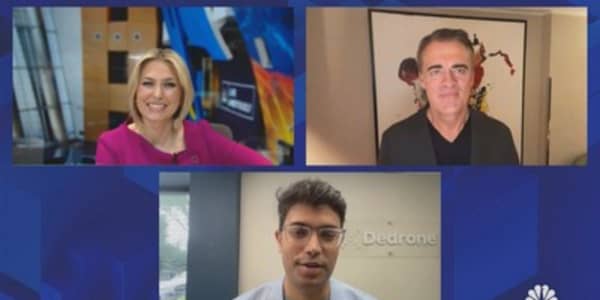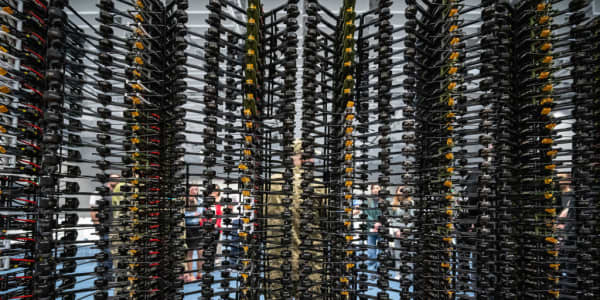
Imagine a world where your entry ticket to an event, or boarding pass for a flight, or your form of payment for a good or service is invisible data transferred by way of sound waves. That world is already here, and it's exactly what Rodney Williams is doing at the company he co-founded, Lisnr, a Cincinnati-based technology start-up.
"If I was going to use some type of mobile pay scenario, I only have a QR code or a NFC [chip] as an alternative," Williams told CNBC, referring to two popular methods of communication used by current mobile devices. QR codes are vulnerable to security breaches, while NFC technology is expensive and not available in all payment situations.
"But I want to mobile pay everywhere: every parking meter, every taxicab, everywhere that I have an option ... and the only option today is a piece of hardware. And we're the software alternative," the Lisnr CEO said Wednesday on "Power Lunch."
Lisnr earned the No. 22 spot on the 2018 CNBC Disruptor 50 list.
Lisnr, launched in 2012, creates inaudible smart tones that are an alternative to WiFi and Bluetooth-based communications so you don't need an internet connection to send data. Lisnr's software, a near-ultrasonic, low-power data transmission technology, can transmit data between devices by way of a speaker and a microphone.
Part of its plan is a big disruption of the entire ticketing industry.
"That industry has chosen to go to mobile ticket," Williams said. "Every time you use a ticket or at an airline, they've chosen a QR code. But it's a fraudulent vehicle. I can screenshot it. I can share it. It's one of the reasons why you still have to use your ID."
As an example, he said the popular Starbucks mobile pay app could easily be screenshot and then the person stealing the bar code could use it. "I could buy coffee anywhere I want," Williams said in a follow-up interview to his TV appearance.
"QR codes are the real issue," he said. The Lisnr CEO noted that China implemented a ban on mobile payments, over certain amounts, that use QR codes at the end of 2017 due to the security risks.
One company that Lisnr is disrupting but at the same time working with is Live Nation Entertainment's Ticketmaster, which is using the sound-based technology as an alternative to conventional ticketing methods.
What Google has proved is that there is a value in the technology, and we are proving it's bigger than a single platform.Rodney Williamsfounder and CEO of Lisnr
Apple Pay, as another example, uses NFC chip technology, which is more secure than QR codes but is expensive to deploy, as it requires more costly hardware.
Lisnr's business proposition is to be as flexible as a QR code but more secure, while less expensive than NFC chips but still scalable.
"We imagine a world where sound is more seamless," he said. "Better consumer experience. But we're matching the security element of an NFC-type transaction."
The company has more than 100 partnerships and customers, including Intel, Amdocs, JLR and Visa, and the technology is used in about 100 million devices worldwide, Williams said. Lisnr is also in the car market through a deal with Jaguar Land Rover.
What Apple, Amazon and Alphabet are doing in this market
The biggest competition it may face is from the tech giants: Alphabet, Amazon and Apple.
Williams noted that Apple Pay is secure, but you can't use it everywhere. "Imagine adding NFC to every parking meter. It's expensive to do that."
Williams pointed out that Alphabet's Google is experimenting with technology similar to Lisnr but said Lisnr is 12 times faster. Another advantage Lisnr claims is being technology-agnostic.
"We have a purpose to work everywhere," he said. "That's not Google's purpose. Google's purpose is to enable Android. Our purpose is to enable Linux, Windows, iOS to talk to Android and Android to talk to an embedded system. That's the difference between creating a communication platform versus a product."
"What Google has proved is that there is a value in the technology, and we are proving it's bigger than a single platform," Williams said.
Google's most successful use case for the technology has been in India, where it works as a mobile wallet payment solution, he said. "India has security issues and data constraints because it costs a lot to transfer data. Sound is less data-intensive and more secure than a QR code."
Lisnr will be launching a few partnerships in India this year, though Williams declined to name partners. He said Asia as a whole represents roughly 40 percent of its business.
The Lisnr CEO expects the personal artificial intelligence and home assistant market led by Amazon Echo, Google Home and Apple HomePod to push into this area. But Williams said similar security issues will surface because data from cloud-based voice services, such as Alexa, can be hacked or mimicked.
"They're really going to be using it," he said.
"There [are] always bad actors," Williams said on CNBC. "But a bad actor still has to intrude your device. And that intrusion happens through USB and any other methods of downloads to a particular device. That intrusion could use Bluetooth, WiFi or any other way to cause mischief on your device."
Lisnr's data transmission through ultrasonic audio bypasses this process. "Voice-enabled services should detect you using something else. That's us," he said.
"It's actually a standard that could apply significant security to the entire world of ultrasonic use," Williams said.
More from CNBC Disruptor 50:
Ellevest caters to the needs of female investors
SoFi will get crypto investing by 2019, says CEO Anthony Noto









